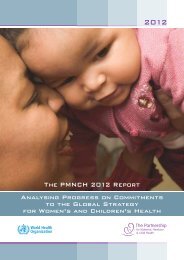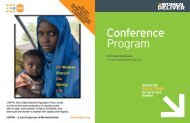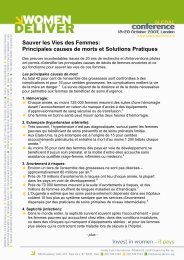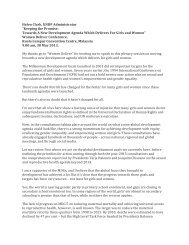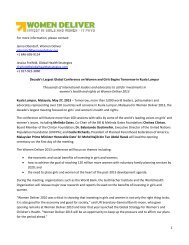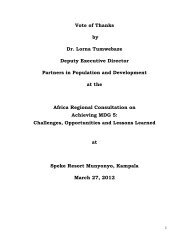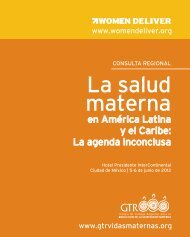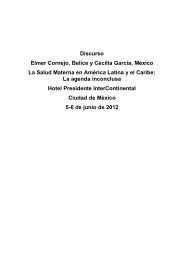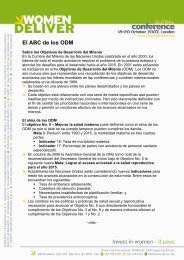Health: a social and economic rightThe International Covenant on Civil andPolitical Rights, ICCPR and the InternationalCovenant on Economic, Social and CulturalRights, ICESCR, were developed during the1960s to ensure the principles referenced in theUniversal Declaration <strong>of</strong> Human Rights wouldbe implemented. Human rights activists haveensured that the ICCPR has played a key partin protecting people against government abuses<strong>of</strong> political power while today the ICESCR isinstrumental in activist efforts to persuade governmentsto place the right to a house or a mealon an equal footing with the right to vote (TheEconomist, 2001). Activists in and committedto some <strong>of</strong> the world’s poorest countries havedemanded that economic and social goods betreated as entitlements in places where access t<strong>of</strong>ood and shelter is so lacking as to make evencivil and political rights seem like luxuries.Since 1998, the <strong>World</strong> Health Organizationhas been asking the international community t<strong>of</strong>ormally respect and uphold health as a humanright. The challenge has been to define whatthese social and economic rights—including theright to health—mean in specific and concreteterms that facilitate advocacy and implementation.In 2000, the United Nations Committeeon Economic, Social and Cultural Rightsdefined governments’ “core obligations” toinclude providing equal access to health services,sufficient food, potable water, sanitation andessential drugs.Accountability for rightsNo right exists without obligation, and no obligationis meaningful without accountability.United Nations treaty-monitoring bodies arecharged with tracking government compliancewith major human rights treaties and now routinelyrecommend that governments take actionto protect sexual and reproductive health andreproductive rights (Center for ReproductiveRights, 2009). Under the auspices <strong>of</strong> theHuman Rights Council <strong>of</strong> the United Nations,the Universal Periodic Review involves a <strong>State</strong>drivenreview <strong>of</strong> the human rights records <strong>of</strong> allUnited Nations Member <strong>State</strong>s once every fouryears. Each <strong>State</strong> is given the opportunity todeclare the actions they have taken to improvethe human rights situations in their countriesand to fulfil their human rights obligations.The Committee on the Elimination <strong>of</strong>Discrimination Against Women reviews evidenceon the protection <strong>of</strong> human rightsaround the world and issues recommendations.In 2011, for example, the Committee issuedstrong recommendations to the Governments<strong>of</strong> Nepal, Zambia and Costa Rica to ensurethe sexual and reproductive rights <strong>of</strong> theircitizens (Center for Reproductive Rights,2011a). The independent Expert ReviewGroup was created in 2011 by the UnitedNations Secretary-General to track the GlobalStrategy for Women’s and Children’s Healthand the Commission on Information andAccountability (<strong>World</strong> Health Organization,2010a). With a special focus on ensuring thecommitment <strong>of</strong> resources to fulfil MillenniumDevelopment Goals 4 (to reduce child deathrates) and 5 (to reduce maternal death rates),the independent Expert Review Group willlast four years, delivering its first report tothe United Nations General Assembly inSeptember <strong>2012</strong>.National human rights institutions and courts<strong>of</strong> justice are directly responsible for ensuringthe realization <strong>of</strong> reproductive rights. The KenyaNational Commission on Human Rights, forexample, recently conducted an inquiry into arange <strong>of</strong> reproductive rights abuses in that country(Kenya National Commission on Human6 CHAPTER 1: THE RIGHT TO FAMILY PLANNING
Rights, <strong>2012</strong>). The charges had been broughtin late 2009 by the Federation <strong>of</strong> WomenLawyers–Kenya and the Center for ReproductiveRights, alleging violations <strong>of</strong> reproductive rightsin Kenyan health facilities. The Commission’sassessment found that people’s rights had beenabused, largely as a consequence <strong>of</strong> the poorservice quality and called on the Governmentto make the needed improvements.The Colombian Constitutional Court haspassed important judgments ensuring accessto sexual and reproductive health services(Corte Constitucional de Colombia, <strong>2012</strong>;Reprohealthlaw, <strong>2012</strong>). In 2010, for example,it affirmed the legality <strong>of</strong> and ensured access toemergency contraception.In 2003 <strong>UNFPA</strong> conducted a global survey<strong>of</strong> national experiences 10 years after theICPD (<strong>UNFPA</strong>, 2005a). Of the 151 countriessurveyed, 145 provided responses on theenforcement <strong>of</strong> reproductive rights. Of thosethat responded, 131 reported adopting newpolicies, national plans, programmes, strategiesor legislation on reproductive rights.Family planning and human rights:a frameworkAt the ICPD in 1994, the international communitytranslated its recognition <strong>of</strong> peoples’right to family planning into a commitment toa human rights-based approach to health, whichfocuses on building the capacity <strong>of</strong> <strong>State</strong>s andindividuals to realize rights. Thus people notonly have rights, but <strong>State</strong>s have the obligationto respect, protect and fulfil these rights (Centerfor Reproductive Rights and United Nations<strong>Population</strong> Fund, 2010).In their work to support human rights,United Nations agencies are guided by theUnited Nations Common Understandingon the Human Rights Based Approach toDevelopment Cooperation (2003): in the pursuit<strong>of</strong> the realization <strong>of</strong> human rights as laiddown in the Universal Declaration <strong>of</strong> HumanRights and other international human rightsagreements, “human rights standards andprinciples must guide all development cooperationand programming in all sectors andphases <strong>of</strong> the programming process” (<strong>World</strong>Health Organization and Office <strong>of</strong> the HighCommissioner for Human Rights, 2010). Ahuman rights-based approach is operationallydirected towards developing the capacities<strong>of</strong> rights holders to claim their rights andthe capacities <strong>of</strong> duty-bearers to meet theirtGrace Matthews,a mother-<strong>of</strong>-two,walked and cycledfor three hours to getcontraceptives. Shedecided to have aninjection to delay hernext pregnancy.©Lindsay Mgbor/UK Department forInternational DevelopmentTHE STATE OF WORLD POPULATION <strong>2012</strong>7
- Page 6 and 7: OverviewOne hundred seventy-nine go
- Page 8 and 9: The report is structured to answer
- Page 10 and 11: viiiCHAPTER 1: THE RIGHT TO FAMILY
- Page 12 and 13: “All human beings are born free a
- Page 14 and 15: Treaties, conventions and agreement
- Page 18: “Everyone has the right to educat
- Page 21 and 22: designing and delivering accessible
- Page 23 and 24: use, and reduces unintended pregnan
- Page 26 and 27: 16 CHAPTER 2: ANALYSING DATA AND TR
- Page 28 and 29: Change in Age-Specific Fertility Ra
- Page 30 and 31: Sexuality, sexual and gender stereo
- Page 32 and 33: not necessarily associated with a d
- Page 34 and 35: METHOD EFFECTIVENESSMethod, rankedf
- Page 36 and 37: tCouple visiting a ruralfamily plan
- Page 38: Demand and supply over time5 per ce
- Page 41 and 42: contribute to high unmet need (Sing
- Page 43 and 44: abortions in the region lead to mor
- Page 45 and 46: (as stated in the Convention on the
- Page 47 and 48: arriers prevent individuals from ac
- Page 49 and 50: CHAPTERTHREEChallenges in extending
- Page 51 and 52: sources of sexual and reproductive
- Page 53 and 54: messages were delivered via a numbe
- Page 55 and 56: Ricardo, 2005). Moreover, young and
- Page 58 and 59: per cent in Guatemala. Across all c
- Page 60 and 61: tTeenager inMadagascar listens toa
- Page 62 and 63: Consensual unions account for an in
- Page 64 and 65: when. The proportion of never-marri
- Page 66 and 67:
63 per cent to 93 per cent of young
- Page 68 and 69:
Family planning in humanitariansett
- Page 71 and 72:
Studies suggest that HIV may have a
- Page 73 and 74:
with a public health challenge (Wor
- Page 75 and 76:
State-run family planning programme
- Page 77 and 78:
people in mobile, temporary, and re
- Page 79 and 80:
systems and civic participation to
- Page 81 and 82:
CHAPTERFOURThe social and economici
- Page 83 and 84:
tCommunityeducation inCaracas, Vene
- Page 85 and 86:
Estimates of Total Fertility2010-20
- Page 87 and 88:
children, and healthier women also
- Page 89 and 90:
empirical evidence supporting this
- Page 92 and 93:
tRicardo and Sarain Mexico City say
- Page 94 and 95:
to secure the future population’s
- Page 96 and 97:
86 CHAPTER 5: THE COSTS AND SAVINGS
- Page 98 and 99:
Unintended Pregnancies and outcomes
- Page 100 and 101:
tDonor Commitmentspanel at the Lond
- Page 102 and 103:
UNFPA supports the Health for All c
- Page 104 and 105:
tDr. BabatundeOsotimehin, Executive
- Page 106 and 107:
96 CHAPTER 6: MAKING THE RIGHT TO F
- Page 108 and 109:
When individuals are able to exerci
- Page 110 and 111:
Family planning programmes must ref
- Page 112 and 113:
Family planning programmes reinforc
- Page 114:
tPresident of NigeriaGoodluck Jonat
- Page 117 and 118:
Monitoring Monitoring ICPD ICPD Goa
- Page 119 and 120:
Monitoring Monitoring ICPD ICPD Goa
- Page 121 and 122:
Monitoring Monitoring ICPD ICPD Goa
- Page 123 and 124:
Monitoring ICPD Goals Demographic -
- Page 125 and 126:
Monitoring ICPD Goals - Selected In
- Page 127 and 128:
BibliographyAbbasi-Shavazi, Mohamma
- Page 129 and 130:
Monitoring ICPD Goals - Selected In
- Page 131 and 132:
Monitoring ICPD Goals - Selected In
- Page 133 and 134:
Monitoring ICPD Goals - Selected In
- Page 135 and 136:
Monitoring ICPD Goals - Selected In
- Page 137 and 138:
Monitoring ICPD Goals - Selected In
- Page 140:
Delivering a world where every preg




